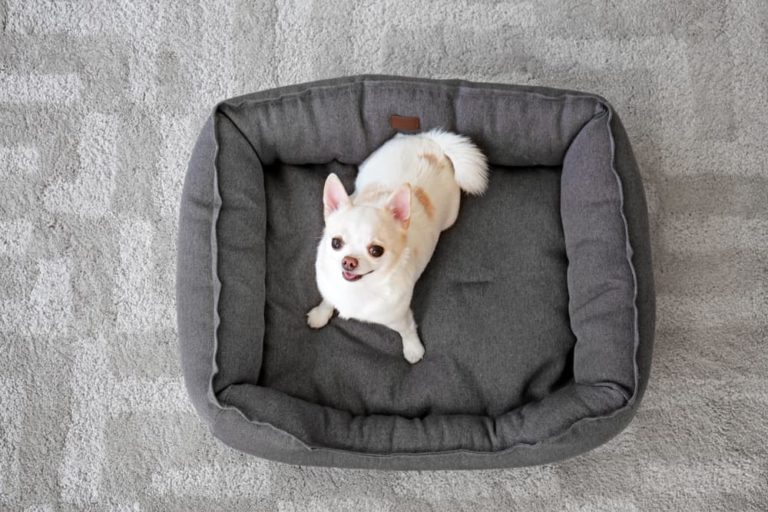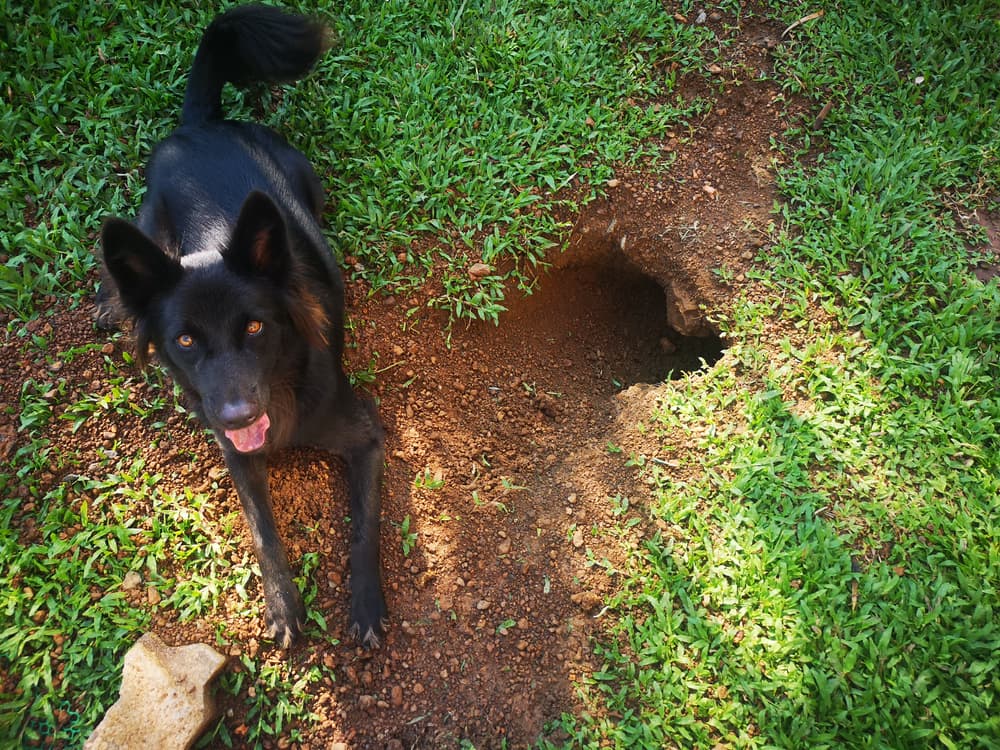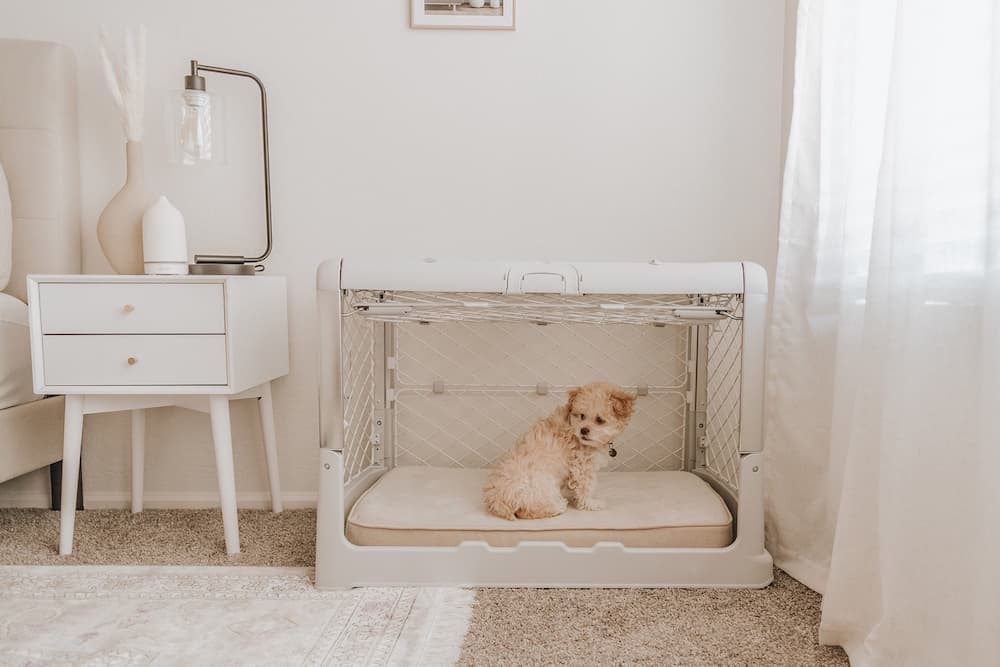Why Do Dogs Dig in Bed?

We all have our nighttime routines before getting ready for bed. And as a pet parent, you’ve probably noticed similar routine behaviors from your dog before they settle in for the night: last calls to go outside, final zoomies of the day, or maybe even begging for a bedtime treat!
And while you’re fluffing pillows and arranging blankets, your dog is furiously digging at their own bed (or maybe even yours!) in a frenzy before promptly lying down and going to sleep. But why do dogs dig in bed?
In this article we’ll explore and explain why dogs dig in their beds or other areas before resting, and what you can do if this behavior is causing any nighttime disruption or even damage to bedding.
Dogs Digging in Bed: What Does It Look Like?
When dogs dig in bed, it closely resembles how they might dig when they’re outdoors. Maybe you’ve noticed your dog kicking grass up after relieving themself, or even engaging in some classic backyard toy-burying behavior. Either way, there’s a distinct digging and scratching motion to get the job done.
In the same sense, when dogs dig in bed, they may scratch at blankets or cushions, perform multiple spins, and kick up bedding before finally settling down to cozy up and relax. It might not last longer than a few seconds or minutes at the most, and the end result might seem a bit random or sporadic.
Digging may be a bedtime routine that occurs in the evening before sleep, or maybe your dog engages in it anytime they’re looking to lie down and relax. If you recognize bedtime digging in your own canine companion, you might still be wondering why they do this.
Why Do Dogs Dig in Bed?

To better understand why dogs dig in bed, let’s take a look at the history and evolution of dogs in general. It can be easy to forget that prior to becoming domesticated, those lovable four-legged family members were wild animals. Back in the day, dogs had to survive in nature, and many of their instinctual habits are still baked in generations later.
“Domestic dogs are descendants of wild dogs (wolves and coyotes) and are hardwired to play out survival behaviors for living in the wild, even though they may not need them in the environments we put them in,” says dog trainer and behavior specialist Susan Rosetti, owner of Soozy Pooch in Philadelphia. “Most unwanted, or so-called ‘bad,’ dog behaviors are actually just normal canine behaviors being played out in a modern human environment.”
A wild dog surviving in nature would need to be able to create a safe shelter to rest in, which could require clearing any natural obstacles like cold or wet surfaces, stones, or other debris while creating a protected nesting area. Just like your dog may snuggle close to you for warmth, digging a small hole in nature to cozy up into would provide a similar level of warmth and safety.
“The reason dogs circle or paw at a spot before lying down goes back to a survival technique to move any bugs or small critters out of the way and to flatten out or soften the spot to lay down and rest,” says Rosetti. “It’s just that simple.”
Dogs Digging in Bed: Is It Normal?
For dogs, digging in bed is definitely normal behavior. And for specific breeds like Terriers and Dachshunds – originally bred for tunneling and hunting small critters – the act of digging is something that’s naturally ingrained.
But while most dog digging can be credited with natural instinctive behavior that’s been passed down genetically, there may be other reasons behind the behavior that pet parents want to consider.
For instance, if your dog is incessantly digging in bed for longer periods of time outside of resting, it could be a sign of anxiety – particularly if it comes through as more compulsive behavior that causes damage to furniture or bedding. If you worry your dog may be experiencing some underlying anxiety, it’s important to consult your veterinarian for proper care and treatment.
Digging is also a way for dogs to mark their territory and claim a space as their own. Your dog’s bed and blankets are theirs, and the digging, spinning, rolling around motions allows them to continue to claim and reinforce their space.
What to Do if Your Dog is Digging in Bed

In most cases, if your dog is digging in bed they’re simply acting out their instinct to feel relaxed and safe, or even mark their territory. Most of the time, this should be harmless behavior. So if your dog is digging in bed, simply allow it to play out so you both can eventually relax – especially if it occurs in your dog’s own bed and blankets.
When it comes to other furniture or your own bed, things may be a bit different. If your dog sleeps in your bed or on a couch and the digging is causing significant damage, then you may want to curb the behavior slightly. This task can be difficult if the digging is a result of instinctual, not learned, behavior.
Rosetti recommends a few different solutions. The first is to simply not allow your dog to lie on any furniture that you don’t want damaged. If that’s not an option, you can try putting a dog bed, a pillow, or a fluffy blanket that won’t get damaged on a favorite furniture spot for your dog. That way they only dig and spin in their designated area.
If that doesn’t work, Rossetti recommends disrupting the dog in the process of circling and digging while redirecting them into a down command with a reward. It’s important to note that the behavior itself is normal and dogs shouldn’t be reprimanded for the behavior.
Other than that, if it’s not bothering you or damaging your belongings, and your dog seems content, a little bedtime digging is nothing to be concerned about.









